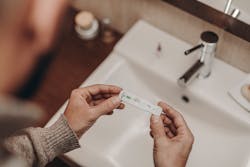First-line immune defenses against COVID-19 are short-lived and may explain reinfection
A new study finds that antibodies produced in the nose decline nine months after COVID-19 infection, while antibodies found in the blood last at least a year.
The investigators found that the nasal antibodies were only present in those recently infected and were particularly short-lived against the Omicron variant, compared to earlier variants.
These new findings – which are published in eBioMedicine – may explain why people who have recovered from COVID are at risk of reinfection, and especially with Omicron and its subvariants.
The study also found that vaccination is very effective in creating and boosting antibodies in the blood, which prevent severe disease, but had very little effect on nasal IgA levels.
The research was led by teams from Imperial College London and the University of Liverpool. It studied almost 450 people who had been hospitalized with COVID-19 between February 2020 and March 2021, before the emergence of Omicron variant and prior to vaccine rollout.
The study also found that whilst current vaccines are effective at boosting blood antibody which can prevent serious illness and death, they do not significantly boost nasal IgA antibodies.
The study analyzed antibodies of the participants to understand how long nasal antibodies lasted, compared with antibodies found in the blood. They also studied the effect of subsequent COVID-19 vaccines on antibodies in the nose and blood.
Samples were taken when people were hospitalized and at six months and one year after. Since most people were vaccinated during the study, many samples were also taken before and after vaccination.
They measured how well the antibodies neutralized the original SARS-CoV-2 virus, and the Delta and Omicron variants to see how long the antibodies were effective for after infection or vaccination.
The study included 446 people admitted to hospital in the early phase of the pandemic, including 141 who provided samples at the start of the study and six and 12 months later. For participants who only had one sample taken during the 12-month period of study, the researchers used modelling to estimate how the average antibody responses changed over time.
Of those who confirmed whether they had been vaccinated (323 people), 95% (307 people) received their first vaccination during the study follow-up period. This led to increases in all nasal and blood antibodies, but the change in the first-line defense nasal antibodies (IgA) was small and temporary. The researchers found that the participants’ sex, disease severity and age did not impact how long their nasal immunity lasted, but caution that their study was only in people with severe disease that required hospitalization.
They also found that blood antibody from participants continued to bind the original SARS-CoV-2 virus and the Delta and Omicron variants a year after infection but found that booster vaccines are needed to maintain this immunity.

